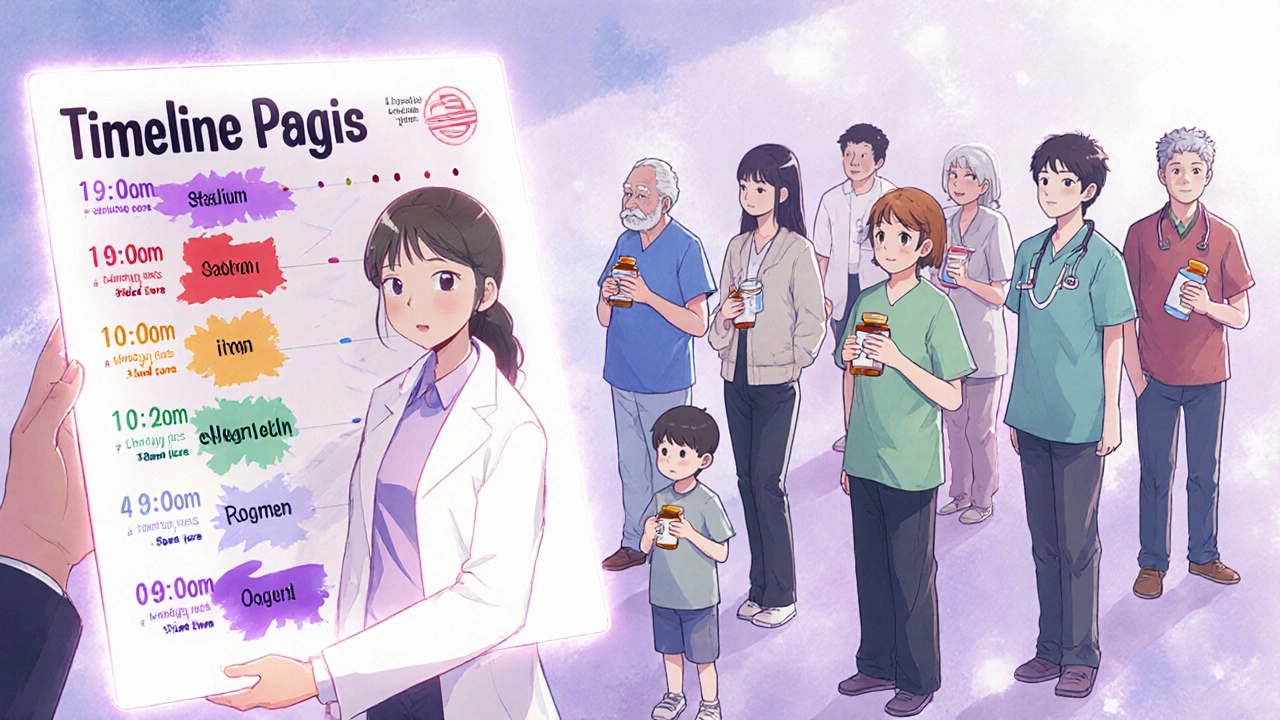Many people take calcium and iron supplements without realizing they could be making their medications less effective-or even useless. It’s not just about taking pills at the same time. The problem is deeper: calcium and iron bind to certain drugs in your gut, forming complexes your body can’t absorb. If you’re on antibiotics, thyroid medicine, or heartburn pills, this could be quietly hurting your health.
How Calcium Blocks Antibiotics
Calcium doesn’t just strengthen bones-it can stop antibiotics from working. Tetracycline, doxycycline, minocycline, and fluoroquinolones like ciprofloxacin all get tied up by calcium. When you take a calcium supplement (or even a glass of milk) within a few hours of these drugs, the calcium grabs onto them like a magnet. This creates an insoluble compound that passes right through your gut without being absorbed.Research shows calcium carbonate can cut ciprofloxacin’s absorption by 40%. That means if you’re taking it for a urinary tract infection or pneumonia, you might not get enough of the drug into your bloodstream to kill the bacteria. The result? Longer illness, stronger infections, or even antibiotic resistance.
The fix? Don’t take calcium supplements within two hours before or after these antibiotics. For safety, many pharmacists recommend waiting four to six hours. If you’re on a short course of antibiotics-say, seven days-skip the calcium supplement entirely during that time. Your bones will be fine. Your infection won’t.
Iron and Antibiotics: A Similar Battle
Iron supplements like ferrous fumarate, ferrous sulfate, and ferrous gluconate do the same thing. They bind tightly to tetracycline and fluoroquinolone antibiotics, just like calcium does. If you’re taking iron for anemia and need an antibiotic for a sinus infection or bronchitis, timing matters.GoodRx recommends taking iron at least two hours before or four hours after these antibiotics. That’s not just a suggestion-it’s based on clinical studies showing how much less drug gets absorbed when they’re taken together. For example, if you take your iron at 7 a.m., wait until at least 11 a.m. to take your doxycycline. Or take the antibiotic in the morning and the iron at night.
And don’t forget: iron isn’t just absorbed better on an empty stomach-it needs stomach acid. That’s why proton pump inhibitors (PPIs) like omeprazole and pantoprazole, and H2 blockers like famotidine, can make iron supplements less effective. These heartburn meds reduce acid in your stomach, and without acid, iron doesn’t dissolve properly. If you take both, space them at least two hours apart. Take the iron before the heartburn pill, not after.
Calcium and Thyroid Medicine: A Silent Problem
If you’re on levothyroxine for hypothyroidism, calcium is one of the biggest threats to your treatment. Studies published in the South Medical Journal show calcium reduces levothyroxine absorption by up to 30%. That means your TSH levels stay high, your fatigue doesn’t improve, and your weight might keep creeping up-even if you’re taking your pill every morning.The solution? Wait at least four hours between calcium and levothyroxine. Many people take their thyroid pill first thing in the morning, then have cereal with milk or a calcium-fortified orange juice right after. That’s a recipe for failure. Instead, take your thyroid pill on an empty stomach with water, then wait four hours before eating anything with calcium-yogurt, cheese, fortified plant milk, or supplements.
Some patients find it easier to take levothyroxine at bedtime, at least two hours after dinner. That way, they can take calcium with breakfast the next day without conflict. But check with your doctor first-this isn’t right for everyone.

Iron and Milk: Why Your Child’s Anemia Isn’t Improving
Parents often give iron supplements to kids with anemia, but then they serve milk with meals. That’s a problem. Milk contains calcium, and calcium blocks iron absorption. HealthyChildren.org notes that iron taken with milk may be absorbed at less than half the rate of iron taken with orange juice.Instead of milk, pair iron with vitamin C-rich foods. Orange juice, strawberries, bell peppers, or broccoli help iron absorb better. Even a small glass of OJ with your child’s iron pill can make a big difference. Avoid dairy for at least two hours before and after the dose.
This isn’t just for kids. Adults with iron deficiency face the same issue. If you’re drinking almond milk or soy milk fortified with calcium, it’s doing the same thing. Check the label. If it has added calcium, treat it like a calcium supplement-space it out from your iron.
What About Other Minerals?
Calcium and iron aren’t the only offenders. Zinc, magnesium, and even antacids with aluminum or magnesium can interfere with antibiotics and thyroid meds. Zinc, for example, can reduce the absorption of quinolone antibiotics. Magnesium in laxatives or antacids can bind to tetracyclines.It’s not just supplements. Some multivitamins contain high doses of these minerals. If you’re taking a daily multivitamin with iron or calcium, read the label. If it has more than 50 mg of calcium or 18 mg of iron, it’s likely interfering with your meds. Talk to your pharmacist about switching to a low-mineral version during antibiotic or thyroid treatment.
Real-Life Scenarios: What Goes Wrong
A 68-year-old woman takes levothyroxine every morning, then eats yogurt with granola and a calcium supplement. Her TSH stays above 6.0 for months. She’s told her dose is too low-so her doctor increases it. But the real issue? The calcium. Once she waits four hours after her pill before eating, her TSH drops to normal.A 12-year-old boy with acne gets prescribed doxycycline. His mom gives him iron drops for anemia at breakfast. Two weeks later, his acne hasn’t improved. The antibiotic wasn’t absorbed. They spaced the iron two hours before the antibiotic, and within a week, his skin cleared up.
A man with GERD takes omeprazole daily and iron pills at night. He feels tired all the time. His ferritin level is low. His doctor realized the PPI was blocking iron absorption. He switched to taking iron two hours before his omeprazole, and his iron levels normalized in three months.

What to Do: A Simple Action Plan
- Check your meds. If you’re on antibiotics, thyroid medicine, or heartburn pills, look up whether calcium, iron, zinc, or magnesium are listed as interactions.
- Time your doses. Separate calcium and iron from antibiotics by at least two hours, and from thyroid meds by four hours. For heartburn meds, take iron two hours before.
- Use orange juice, not milk. With iron, pair it with vitamin C. Avoid dairy, fortified drinks, and calcium-rich foods for two hours before and after.
- Don’t assume supplements are safe. Multivitamins, bone health blends, and prenatal pills often contain calcium or iron. Read labels.
- Talk to your pharmacist. They can review all your meds and supplements in minutes. Ask: “Could any of these be canceling each other out?”
When to Call Your Doctor
If you’ve been taking your medication correctly but aren’t seeing results-your infection won’t clear, your fatigue won’t lift, your TSH stays high-it’s worth asking if mineral supplements are the culprit. Don’t stop your meds. Don’t guess. Ask for a blood test to check your iron levels or thyroid hormone levels. Then ask your pharmacist to map out your supplement and medication schedule.These interactions aren’t rare. They’re common. And they’re preventable. You don’t need to give up your supplements. You just need to know when to take them.
Can I take calcium and iron together?
No, don’t take calcium and iron together. They compete for the same absorption pathways in your gut. Taking them at the same time means your body absorbs less of both. Space them at least two hours apart. If you need both, take iron in the morning and calcium at night, or vice versa.
Does milk affect iron absorption?
Yes. Milk contains calcium, which binds to iron and stops it from being absorbed. Even fortified plant milks like soy or almond milk with added calcium have the same effect. If you’re taking an iron supplement, avoid milk, yogurt, or cheese for at least two hours before and after the dose. Instead, take it with orange juice or another source of vitamin C.
How long should I wait between levothyroxine and calcium?
Wait at least four hours. Studies show calcium can reduce levothyroxine absorption by up to 30% if taken too close together. If you take your thyroid pill in the morning, wait until after lunch or early afternoon before eating calcium-rich foods or taking a supplement. Some people switch to taking levothyroxine at bedtime-four hours after their last meal-to avoid the conflict entirely.
Can I take iron with my heartburn medicine?
Not at the same time. Heartburn meds like omeprazole, pantoprazole, and famotidine reduce stomach acid, which your body needs to absorb iron. Take your iron supplement at least two hours before your heartburn pill. If you need to take the heartburn medicine during the day, plan your iron dose for the night before bed, two hours after dinner.
What if I forget and take them together?
If you accidentally take calcium or iron with your antibiotic or thyroid pill, don’t panic. One mistake won’t ruin your treatment. But don’t make it a habit. Just take your next dose correctly spaced. If you’re on antibiotics, you might need to extend your course slightly-talk to your doctor. For thyroid meds, your next blood test will show if your dose needs adjusting.
Are there supplements that don’t interfere?
Some iron supplements are formulated to be less affected by stomach acid, like ferric citrate or heme iron polypeptide, but they’re not widely available without a prescription. Calcium citrate is slightly less interfering than calcium carbonate, but still blocks absorption of certain drugs. The safest approach isn’t finding a “safe” supplement-it’s timing. Always space them out.
Final Tip: Keep a Medication Log
Write down everything you take-prescriptions, supplements, even over-the-counter antacids. Note the time. Then, map out your day. If you see calcium, iron, or magnesium in the same window as your thyroid or antibiotic, adjust. Many people use free apps like Medisafe or MyTherapy to set alerts for spacing. Or just use your phone’s alarm. Two hours, four hours-it’s not complicated. It’s just easy to forget.Your health isn’t about taking more pills. It’s about taking them right. And sometimes, that means waiting.






Liam Dunne
November 17, 2025 AT 14:49Man, I wish my pharmacist had told me this years ago. I was taking my levothyroxine with my morning smoothie-spinach, banana, calcium-fortified almond milk-and wondering why my TSH never budged. Turned out, the calcium was blocking it. Switched to water only, waited four hours before eating, and boom-normal levels in two months. Simple fix, huge difference.
Philip Rindom
November 18, 2025 AT 14:31So let me get this straight-I’ve been taking my iron with my coffee and milk for years, and now you’re telling me that’s why my energy’s always trash? 😅
Jess Redfearn
November 18, 2025 AT 20:07Wait so milk is bad for iron? But my mom always said milk makes you strong. So is she wrong? I’m confused.
Sharon Campbell
November 19, 2025 AT 11:51Yeah right. Next they’ll say sunlight causes cancer or that water is a government plot. I take my pills however I want and I’m fine. This is just pharma fearmongering to sell you more tests.
sara styles
November 20, 2025 AT 14:25This is exactly what I’ve been screaming about for years! The entire medical-industrial complex is built on keeping you dependent. They don’t want you to know that calcium and iron interactions are preventable-they want you on lifelong meds, getting blood tests every three months, paying for ‘special’ supplements that don’t even work because you’re taking them wrong. And don’t get me started on how PPIs are destroying gut flora while pretending to fix acid reflux. It’s all connected. Big Pharma, big dairy, big multivitamin corporations-they’re all in bed together. You think this article is about timing? It’s about control. You’re being manipulated into believing you need to follow rules so they can keep selling you pills. Wake up.
Vera Wayne
November 21, 2025 AT 18:57Thank you so much for this! I’ve been on levothyroxine for 8 years and never realized my morning yogurt was sabotaging me. I’ve started taking my pill at bedtime now-no more 4-hour wait in the morning-and my fatigue has cut in half. Seriously, if you’re on thyroid meds, just try this one change. It’s not magic-it’s science. And you deserve to feel better.
Segun Kareem
November 22, 2025 AT 07:20Look, I used to think this stuff was overhyped-until my uncle ended up in the hospital with a resistant staph infection because he took his doxycycline with his protein shake full of calcium. They had to switch him to IV antibiotics. This isn’t theoretical. It’s life-or-death. If you’re on meds, treat your supplements like they’re dynamite-handle with care, keep them apart. Your body isn’t a blender. Don’t throw everything in at once and hope for the best.
Ashley B
November 22, 2025 AT 14:37Oh, so now it’s calcium’s fault my anxiety spiked? I knew it. They’ve been poisoning the water supply with synthetic calcium since 2015. They want us weak, dependent, and docile. And don’t even get me started on how fortified plant milks are just corporate propaganda disguised as ‘healthy alternatives.’ They’re not even real milk! They’re chemically engineered to mimic dairy while blocking your absorption of everything good. It’s a mind control scheme. I stopped all supplements. I only eat raw, organic, unfortified foods now. And I’m still sick. Coincidence? I think not.